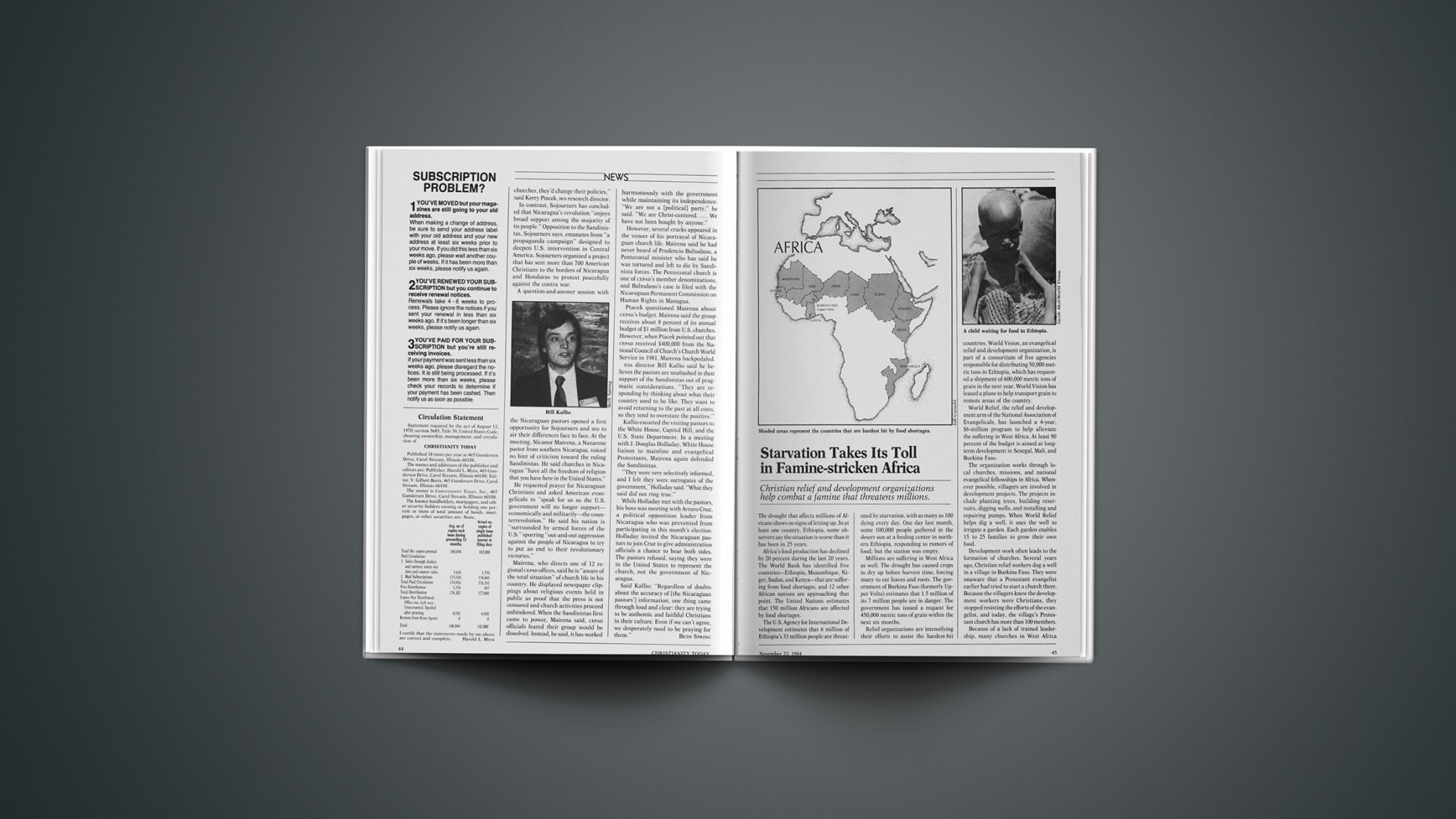The drought that affects millions of Africans shows no signs of letting up. In at least one country, Ethiopia, some observers say the situation is worse than it has been in 25 years.
Africa’s food production has declined by 20 percent during the last 20 years. The World Bank has identified five countries—Ethiopia, Mozambique, Niger, Sudan, and Kenya—that are suffering from food shortages, and 12 other African nations are approaching that point. The United Nations estimates that 150 million Africans are affected by food shortages.
The U.S. Agency for International Development estimates that 6 million of Ethiopia’s 33 million people are threatened by starvation, with as many as 100 dying every day. One day last month, some 100,000 people gathered in the desert sun at a feeding center in northern Ethiopia, responding to rumors of food; but the station was empty.
Millions are suffering in West Africa as well. The drought has caused crops to dry up before harvest time, forcing many to eat leaves and roots. The government of Burkina Faso (formerly Upper Volta) estimates that 1.5 million of its 7 million people are in danger. The government has issued a request for 450,000 metric tons of grain within the next six months.
Relief organizations are intensifying their efforts to assist the hardest-hit countries. World Vision, an evangelical relief and development organization, is part of a consortium of five agencies responsible for distributing 50,000 metric tons in Ethiopia, which has requested a shipment of 600,000 metric tons of grain in the next year. World Vision has leased a plane to help transport grain to remote areas of the country.
World Relief, the relief and development arm of the National Association of Evangelicals, has launched a 4-year, $6-million program to help alleviate the suffering in West Africa. At least 90 percent of the budget is aimed at long-term development in Senegal, Mali, and Burkina Faso.
The organization works through local churches, missions, and national evangelical fellowships in Africa. Whenever possible, villagers are involved in development projects. The projects include planting trees, building reservoirs, digging wells, and installing and repairing pumps. When World Relief helps dig a well, it uses the well to irrigate a garden. Each garden enables 15 to 25 families to grow their own food.
Development work often leads to the formation of churches. Several years ago, Christian relief workers dug a well in a village in Burkina Faso. They were unaware that a Protestant evangelist earlier had tried to start a church there. Because the villagers knew the development workers were Christians, they stopped resisting the efforts of the evangelist, and today, the village’s Protestant church has more than 100 members.
Because of a lack of trained leadership, many churches in West Africa founded since the drought began don’t have pastors. Those that do often don’t see their pastors in the pulpit on Sunday mornings, so weakened are they by inadequate nutrition.
In some parts of Africa, progress is being made in the battle against the famine. With technical input and financing from World Vision, three villages in Ghana formed a development committee, which meets weekly to determine what projects should be carried out. In less than two years, the villagers—both Muslims and Christians—cleared nearly 100 acres of land to grow crops, built a dispensary, and inoculated their children. World Vision has set a cutoff date for funding so the villagers will not become dependent on outside assistance.
However, until the millions of Africans suffering from food shortages can become self-sufficient, they will need help from the outside. Moise Napon, World Relief’s West Africa regional representative, said American Christians should share from their abundance.
“Christians here [in the United States] should really consider Christians over there as their brothers and sisters. We belong to the same body,” he said. “… I think it would be a shame if one day we come before the Lord, and this one died from starvation, and this one died because he had had too much.… We should feel responsible for one another.”










